BLACK FRIDAY!! ONLY $6,90
THE GOOD MAN PROTOCOL 15 STEPS TO HAPPIER LIFE IN WORK AND LOVE. THE MINDSET SHIFT THAT HELPS YOU MAGNETIC IN SOCIAL LIVE AND LEADERSHIP.
The Ultimate Method to Unlock Your Personal Growth.
23,576
DOWNLOADS
Quick read to help you save time:
Why struggle alone when you can follow a proven path?
In ebook (The Good Man Protocol), you’ll learn from someone who’s already walked the hard road — faced the self-doubt, setbacks, and slow starts — and came out stronger, wiser, and in control. I’ve done the trial and error so you don’t have to.
Now, I’ll show you how to skip the confusion, avoid the mistakes, and step into the life you were meant to live — with clarity, confidence, and purpose.
✅ You’re already a good person. Imagine what could happen if you had the right direction to turn that goodness into real impact?
✅ You’re not too old to level up. Your history doesn’t hold you back — only hesitation does. Start now, because better is always possible.
✅ A good man lives with respect — for women, for those who came before him, and for the differences that make us human. That’s why he’s admired in life and trusted in business.
✅ Most men talk about being better. Few actually do the work. The Good Man Protocol is for the few — the ones who choose to lead with integrity and class.
Point: New Year. New Man. Begin your journey to becoming a better person today.



What Does It Really Mean to Be a Good Man Today?
It’s not about having the biggest paycheck, the loudest voice in the room, or the sharpest suit.
It’s about character.
It’s about clarity.
It’s about showing up in the world with honor, direction, and heart — every damn day.
But let’s be real:
Most men weren’t taught how to do that.
We were told to tough it out, suck it up, and never show weakness.
The result?
Too many men are burnt out, disconnected, and silently asking themselves:
“Is this all there is?”
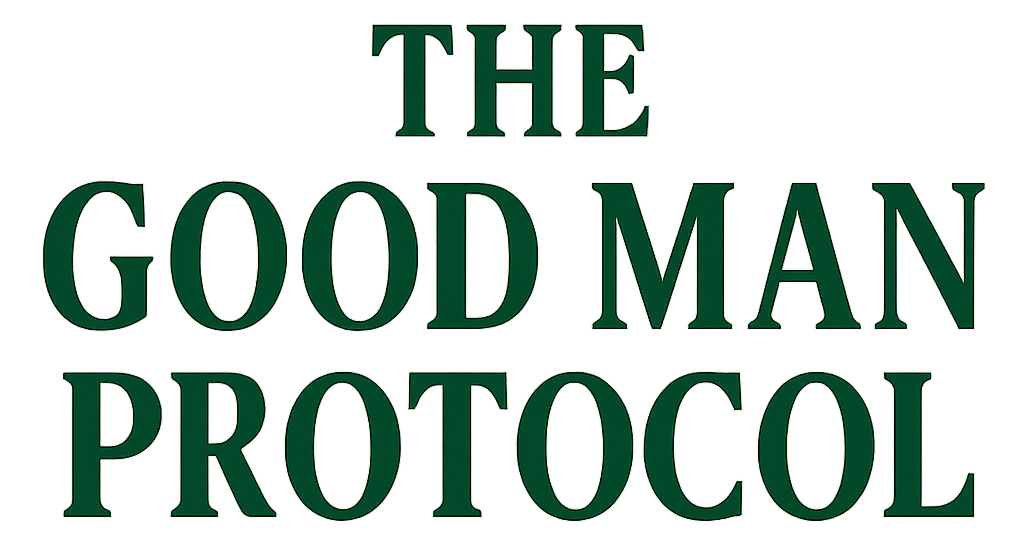

The Logic Behind the 15 Steps
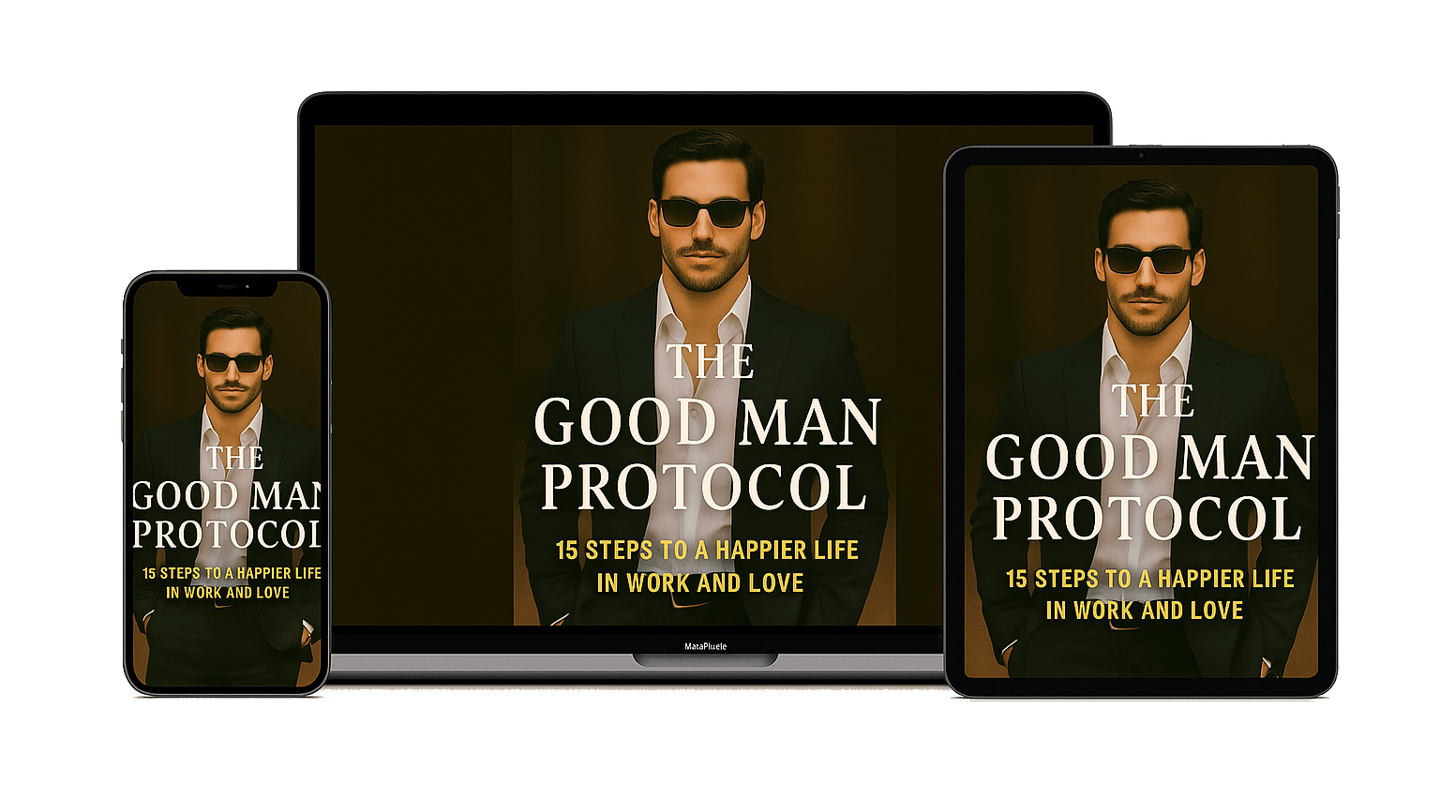

Step 1: Know Your North Star
Why it matters: Defining your values and purpose creates a strong foundation for decision-making and resilience. Studies show that having a clear sense of purpose is linked to better mental health, life satisfaction, and even longevity (Hill & Turiano, Journal of Psychological Science, 2014).
Impact: With clarity on what truly matters, you can align your actions with your goals, improving both personal and professional fulfillment.
Step 2: Master Your Mind
Why it matters: Tackling self-doubt and building resilience can reduce stress and improve performance. Cognitive-behavioral techniques are proven to decrease negative self-talk and boost confidence (Beck, Cognitive Therapy and Emotional Disorders, 1976).
Impact: A resilient mindset enhances your ability to handle challenges in both relationships and work.
Step 3: Build a Body You Respect
Why it matters: Physical health is deeply connected to mental health. Regular exercise improves mood, boosts self-esteem, and lowers anxiety (Pierce et al., Journal of Health Psychology, 2018).
Impact: A healthy body supports confidence, energy, and a positive outlook, all essential for thriving in love and career.
Step 4: Speak Truth, But With Heart
Why it matters: Honest communication fosters trust and emotional intimacy. Research highlights that authenticity leads to healthier relationships and workplace satisfaction (Kernis & Goldman, Annual Review of Psychology, 2006).
Impact: Being truthful while maintaining empathy strengthens connections and builds respect.
Step 5: Work With Purpose
Why it matters: Purpose-driven work leads to higher engagement and motivation. A study by Gallup found that people who feel their work has meaning report higher well-being and productivity.
Impact: Meaningful work keeps you inspired and aligned with your goals, improving overall life satisfaction.
Step 6: Lift Others Up
Why it matters: Acts of generosity and mentorship are linked to increased happiness and stronger social connections (Dunn et al., Science, 2008).
Impact: Supporting others cultivates a sense of community and purpose, enriching both personal and professional relationships.
Step 7: Love Without Losing Yourself
Why it matters: Maintaining individuality in relationships promotes healthier dynamics. Studies suggest that self-differentiation improves relationship satisfaction (Skowron & Friedlander, Journal of Counseling Psychology, 1998).
Impact: You maintain a strong sense of self while building meaningful partnerships.
Step 8: Own Your Mistakes
Why it matters: Accountability fosters trust and personal growth. Research shows that admitting mistakes improves learning and strengthens relationships (Edmondson, Harvard Business Review, 2011).
Impact: Owning your missteps builds credibility at work and nurtures deeper connections in love.
Step 9: Seek Adventure, Not Comfort
Why it matters: Embracing challenges fosters growth and resilience. A study on "comfort zones" found that stepping into discomfort promotes personal development (Brown, Daring Greatly, 2012).
Impact: Taking risks enhances confidence and adaptability in both personal and professional realms.
Step 10: Guard Your Time
Why it matters: Time management is essential for reducing burnout and improving productivity. Research links prioritizing time with higher life satisfaction (Kahneman & Deaton, PNAS, 2010).
Impact: Protecting your time allows you to focus on what truly matters in work and relationships.
Step 11: Laugh at the Chaos
Why it matters: Humor reduces stress, builds social bonds, and improves emotional well-being (Martin, The Psychology of Humor, 2007).
Impact: A lighthearted perspective helps navigate challenges while keeping relationships and work enjoyable.
Step 12: Leave a Legacy Worth Remembering
Why it matters: Legacy thinking promotes long-term goals and meaningful contributions, enhancing life satisfaction (McAdams, Generativity and Life Stories, 2001).
Impact: Focusing on legacy motivates you to live with intention, positively impacting both personal and professional circles.
Step 13: Forge Strength Through Action
Why it matters: Taking consistent action builds competence and confidence. Behavioral activation is proven to combat anxiety and foster growth (Jacobson et al., Clinical Psychology Review, 2001).
Impact: Proactive behavior leads to measurable progress in career and personal development.
Step 14: What’s Next
Why it matters: Continuous learning keeps you adaptable in an ever-changing world. Lifelong learning is associated with improved cognitive function and career satisfaction (Laal & Salamati, Procedia - Social and Behavioral Sciences, 2012).
Impact: Staying curious and building new skills ensures long-term success and fulfillment.
Step 15: Let Go to Rise Higher
Why it matters: Letting go of past baggage promotes emotional freedom and growth. Acceptance and Commitment Therapy (ACT) emphasizes releasing limiting beliefs to thrive (Hayes et al., Acceptance and Commitment Therapy, 1999).
Impact: Releasing what no longer serves you allows for deeper personal connections and career progression.
Conclusion
By following these steps, you’re essentially building a holistic framework backed by psychological and scientific principles that foster:
Stronger mental and physical health
Healthier relationships
Increased purpose and productivity at work
All of which contribute to a more fulfilling life in both love and work.
THE MINDSET SHIFT THAT HELPS YOU MAGNETIC IN SOCIAL LIVE AND LEADERSHIP.
The Logic Behind


The 15 steps of The Good Man Protocol foster a mindset shift toward purpose, confidence, and authenticity—key traits in social and leadership magnetism.
Purpose-driven individuals are seen as more inspiring (Hill & Turiano, Psychological Science, 2014), while physical and mental resilience boost confidence (Bandura, 1997). Authenticity and vulnerability enhance likability and trust (Kernis & Goldman, Annual Review of Psychology, 2006). Generosity and growth mindset strengthen influence and adaptability (Grant & Gino, Harvard Business Review, 2011; Dweck, 2006). This transformation makes men naturally magnetic in both love and leadership.
A Few Quotes From The Good Man Protocol:




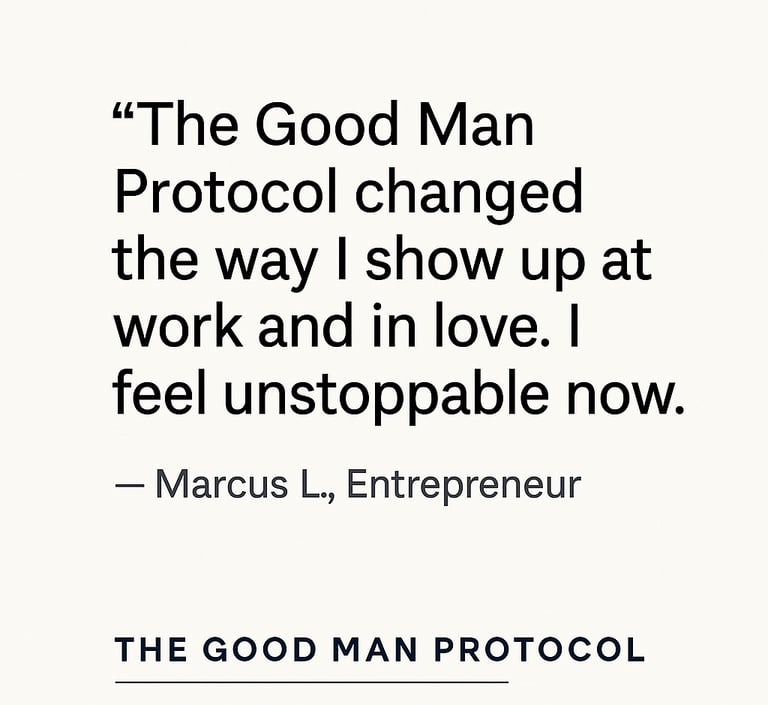

The Good Man Protocol Testimonials
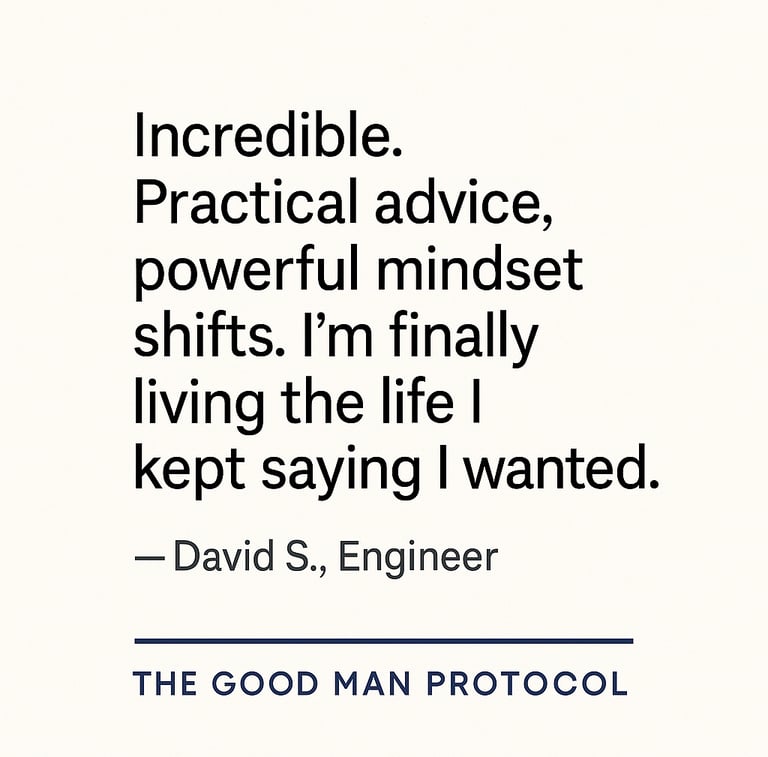

Inside You’ll Learn:
Find your North Star and live with purpose.
Build unshakable mental and physical strength.
Speak your truth with confidence and heart.
Turn your work into a mission that matters.
Own your mistakes and grow stronger every day.
Lift others up and leave a real legacy behind.
Let go of limits and rise into your best life.
The Good Man Protocol's Bonus.
Stop Procrastination Now — Take Control of Your Time and Goals with this exclusive ebook bonus - 3 - DAY METHOD TO BEAT PROCRASTINATION.
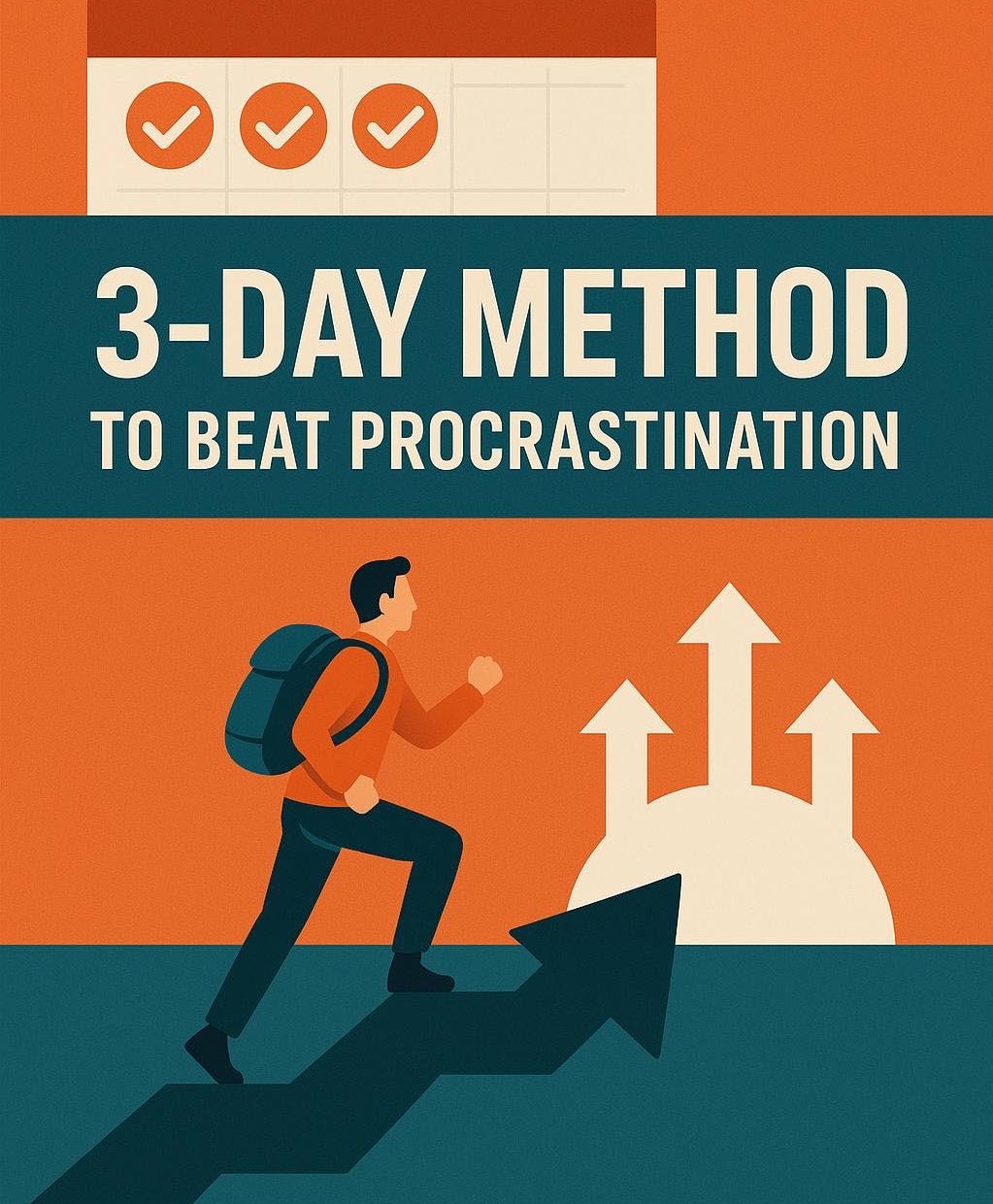

Yes, it’s possible to disrupt procrastination patterns in just 3 days using focused strategies like behavioral activation and implementation intentions. Research shows that even short-term interventions can significantly increase task engagement and reduce avoidance (Gollwitzer & Sheeran, Psychological Bulletin, 2006). Small, consistent actions rewire motivation faster than waiting for inspiration.
The Choice is Yours—But You Have to Act NOW.
Are you ready to keep spinning your wheels, stuck in the same endless cycle of frustration, false promises, and wasted time?
Or will you take control?
The Good Man Protocol gives you 15 powerful steps to help to transform your career, your relationships, and your future.
Don't wait for change to happen. Make it happen. Start today, and watch your life transform in ways you never thought possible.
Take the first step now. The life you want is waiting.
Any question? info@thegoodmanprotocol.com


Be a Part of The Good Man Team!
ONLY TODAY
BLACK FRIDAY
$6,90


✅ Shop with confidence — 30-day guarantee
😎 Not happy? We’ll refund you, no hard feelings
📦 Easy process, zero risk
Copyright 2025 © | The Good Man Protocol | All Rights Reserved
Disclaimer
The Good Man Protocol: 15 Steps to a Happier Life in Work and Love is intended for informational and motivational purposes only. It does not constitute medical, psychological, or therapeutic advice and is not a substitute for professional help. If you are experiencing significant emotional distress, mental health challenges, or any condition requiring clinical support, please seek guidance from a licensed healthcare or mental health professional.
